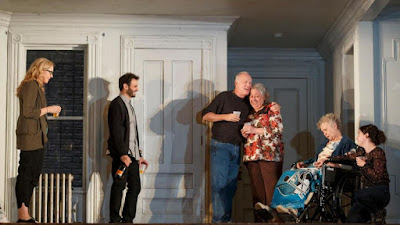the traveler's resource guide to festivals & films
a FestivalTravelNetwork.com site
part of Insider Media llc.
Film and the Arts
Theater Review—'The Humans’ on Broadway
- Details
- Parent Category: Film and the Arts
- Category: Reviews
- Published on Sunday, 20 March 2016 23:36
- Written by Kevin Filipski
The Humans
Written by Stephen Karam; directed by Joe Mantello
Opened February 18, 2016
 |
| The cast of The Humans (photo: Joan Marcus) |
On Broadway, Stephen Karam’s The Humans shows its seams more readily than it did in its earlier off-Broadway incarnation. In this 95-minute play, the Blake family gathers for a Thanksgiving dinner in youngest daughter Brigid and boyfriend Richard's new Chinatown apartment: father Erik, mother Deirdre and grandmother Fiona drove down from Scranton, while oldest daughter Aimee took the train from Philadelphia.
The Humans
Helen Hayes Theatre, 240 West 44th Street, New York, NY
thehumansonbroadway.com
Broadway Review—‘Disaster!' the Musical
- Details
- Parent Category: Film and the Arts
- Category: Reviews
- Published on Friday, 18 March 2016 20:45
- Written by Kevin Filipski
Disaster!
Book by Seth Rudetsky & Jack Plotnick; choreographed by JoAnn M. Hunter
Directed by Jack Plotnick
Opened March 8, 2016
 |
| Adam Rapp and Kerry Butler in Disaster! (photo: Jeremy Daniel) |
Aptly titled, Disaster! is a musical not for the faint of heart. If karaoke versions of cheesy '70s pop hits make you feel queasy, and groaning old jokes and sloppy sight gags give you an upset stomach, then be forewarned: Disaster! revels in gleeful idiocy. Its two hours' traffic on the stage doesn't pretend to be Shakespearean, obviously, but it would have helped if the creators of this forgettable spoof had actually, you know, tried a little harder.
Disaster!
Nederlander Theatre, 208 West 41st Street, New York, NY
disastermusical.com
Minnesota Orchestra Celebrates Sibelius at Carnegie Hall
- Details
- Parent Category: Film and the Arts
- Category: Reviews
- Published on Wednesday, 16 March 2016 15:25
- Written by Jack Angstreich

Osmo Vänskä
The excellent musicians of the Minnesota Orchestra returned to Carnegie Hall on the evening of Thursday, March 3rd, for a valuable program devoted to work by Jean Sibelius, in celebration of the sesquicentennial of his birth, with an audience seemingly packed with ardent Minnesotan fans of the ensemble — all this under the admirable direction of Finnish conductor Osmo Vänskä, perhaps the premier specialist in the orchestral music of this composer.
March '16 Digital Week III
- Details
- Parent Category: Film and the Arts
- Category: Reviews
- Published on Tuesday, 15 March 2016 08:41
- Written by Kevin Filipski
Carol
(Cult Epics)
Addiction Incorporated
CD of the Week
Prokofiev—Piano Concerto No. 3, Symphony No. 5
(Mariinsky)
More Articles...
Newsletter Sign Up













